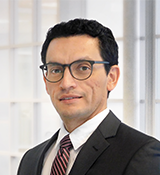Financial Literacy Month represents a month long effort to promote financial education for all ages. Throughout April we will be providing helpful insights from our colleagues about the role of finance in their lives, and how they are passing on the lessons they have learned to their children and families. We hope their feedback can assist you when talking to someone in your family about the benefits of understanding the world of finance throughout their lives.
We spoke to Leandro Palencia, Corporate Counsel, about the role of financial literacy in his life, how he is teaching his son the importance of money, and his best advice on the topic. Visit our Financial Literacy page for resources parents and teachers can use when talking to children of all ages about finance.
Why is it important to be financially literate? How have you benefitted from knowing a few things about finance?
Money is a tool and financial literacy is a skill that helps you best utilize that tool in furtherance of one’s goals. Having knowledge of finance certainly helps with my job. By understanding the firm’s businesses, products and services I can provide better legal advice and it saves my business colleagues time because they don’t have to explain some things that perhaps an attorney without a finance background may not be familiar with. On a personal level it has put me in a comparatively better position when facing the financial obstacles we millennials face: high debt, unattainable housing prices, low savings.
As a father, what sort of financial advice might you teach your kids on the importance of money?
There are a few pieces of advice: 1) Pay yourself first and do it automatically (more on that in the question below on best advice). 2) Equally important is staying informed. The types of assets individuals have access to has grown significantly and evolved rapidly in my lifetime. I can only imagine that in my sons lifetime this will only increase. Staying informed puts one in the best position to seize opportunities and avoid risks. 3) Lastly, use debt responsibly.
Are you planning to start your kid’s college fund? Or, have you?
Absolutely, and as he is gets older, we will want him to have some active role in this effort so he learns about money, savings, investing, planning etc.
What is the best piece of advice in regard to saving/investing/knowledge that you have received or that you have given?
Pay yourself first and do it automatically. Every paycheck, before any expenses put some money directly into your savings. Ideally a part of your direct deposit goes directly into savings and you don’t touch it. If you get a raise, the difference goes right into savings. Obviously how much each person can save depends on their circumstances but a little can go a long way.
What is something you found challenging when learning the benefits of financial literacy and how did you overcome it?
The time commitment. When you look at the different assets, types of accounts, strategies, etc. it is overwhelming, and I have a finance degree! I am trying to learn more about crypto currencies now and the time commitment is definitely a challenge. One thing that helps overcome this is continuing to tell yourself that the time you put in to learning this will put you in a position to make a better decision.
Conclusion
Leandro’s insights and advice show how becoming financially literate is a useful tool at your workplace or even in your home. Utilizing this knowledge can help you and your family succeed when facing financial obstacles or decisions. Finding the time commitment to learn about finance has been challenging for Leandro, but he still takes regular efforts to sharpen his skills. This week, we encourage you to learn something new about finance; whether it is on cryptocurrencies or creating a budget, there is plenty to choose from.
Contributor

Leandro Palencia
Corporate Counsel
